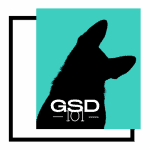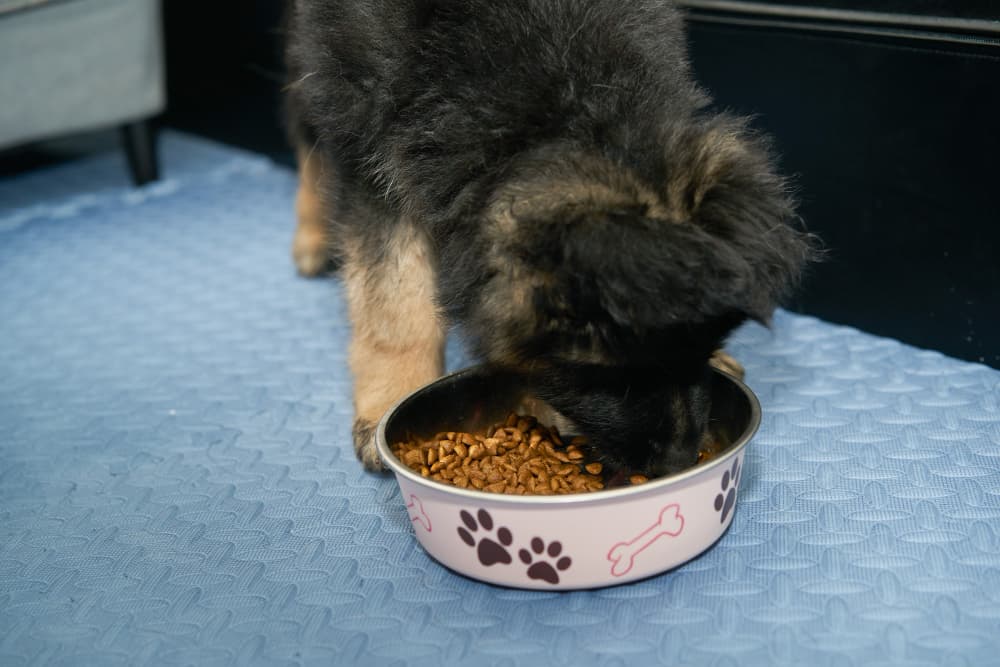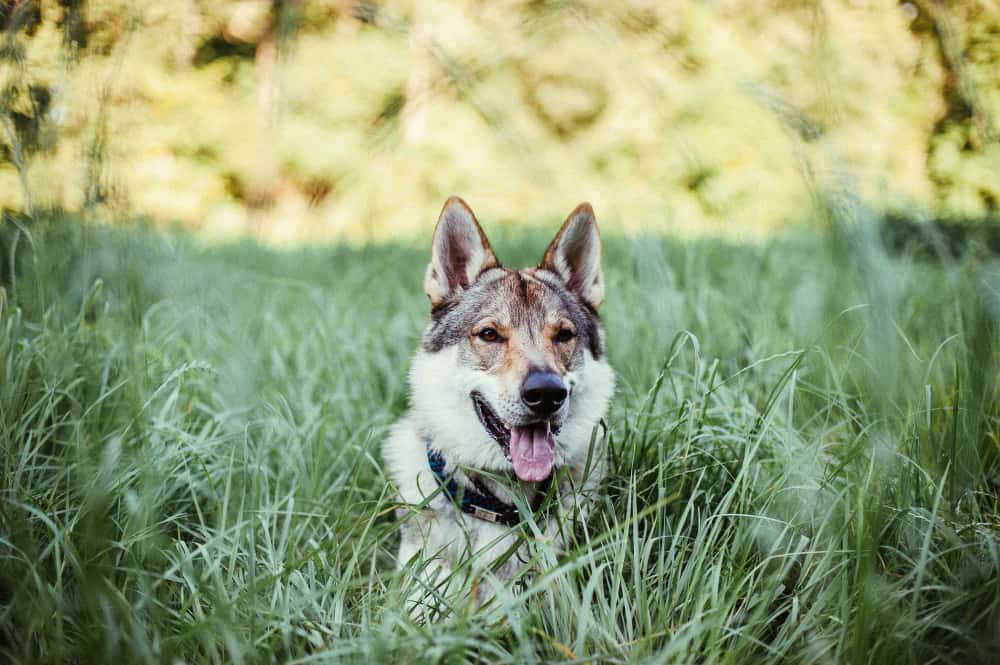At eight weeks, your puppy is in the “fear stage” where he will seem afraid of every new thing. In addition to being socialized to new things, people, and other dogs. Above all, they need proper nutrition to support their rapid growth during this stage.
An 8-week German Shepherd puppy should eat between 1-2 cups of kibble 4 times a day. This amounts to about 1200-2400 calories a day. German Shepherd puppies should be fed with dog food specially formulated for large breed dogs. Dry food, wet canned food, raw diet or homemade diet can also be included in the diet.
Let’s dive deep into what dog food to feed your puppy, how much to feed them, and other feeding guidelines to make your life easier. Check out this video where a new owner share their 24 hours with their new 8-week-old puppy! From getting up every 2 hours, feeding a couple of meals a day, playing, to training, he has been keeping them very busy.
More on feeding your German Shepherds
The Best Food For German Shepherd Puppies: A Beginner’s Guide
The Best Dog Food for a 12 Months German Shepherd
How Much Does an 8-Week-Old German Shepherd Puppy Eat in a Day?
How Much Does a 3-Month-Old German Shepherd Dog Eat in a Day?
How Much Does a 6-Month-Old German Shepherd Dog Eat in a Day?
How Much Does It Cost to Feed a German Shepherd Puppy in the First Year?
The feeding guide for an 8-week-old German Shepherd puppy
Unlike adult German Shepherds (that can be fed twice daily), puppies need up to four meals daily. This is because they have smaller stomachs, but they are also growing rapidly.
Do not be tempted to overfeed your young Shepherd, and do not underfeed either. Too much food could upset their growing tummy or make them gain too much weight quickly. Neither of these is good for your pup’s health.
Here’s a general guide feed your 8-week German Shepherd puppy on a daily basis:
| Feeding Amounts | Feeding times | Mealtime Length |
| 1-2 cups of kibble depending on weight | 4 times a day | 30 minutes |
The good news is, every dog food comes with feeding instructions and guides, do make sure you always read it prior.
Nutrition requirements for an 8-week-old German Shepherd puppy’s growth
At 8 weeks, a German Shepherd is experiencing rapid body growth while also learning to socialize, perfecting their biting skills and undergoing house training. To keep up with all these changes, your puppy will require a healthy diet.
Also read: The Best & Worst Dog Foods Ever – According to a 45-Year Veterinarian
Proper nutrition is essential to the health and development of an 8-week German Shepherd puppy. It can mean the difference between a happy, active, and healthy puppy and a sickly, moody puppy with a slow growth rate.
When choosing food for your puppy, ensure that it contains the main ingredients: fats, proteins, and digestible carbohydrates. It should also contain essential nutrients like vitamins and minerals.
Proteins (22-32%)
The major component of your puppy’s food immediately after weening should be proteins. Puppies need protein for building up their body tissue and for healthy skin and coat. Proteins should constitute 22-32% of their food composition.
You should always look for high-quality proteins from an animal source e.g. beef, lamb, eggs, chicken, and salmon.
Fats (10-25%)
Puppies require fats for the healthy development of their vision, brain, skin, and coat as well as to provide energy. The fats should, however, be limited to 10-25% to prevent obesity and orthopedic diseases resulting from being overweight.
Fish oil, beef fat, chicken fat and eggs are all great sources of fats.
Carbohydrates (<20%)
At 8 weeks, German Shepherd puppies are very active and therefore need carbohydrates to fuel their energy. These nutrients can be found in sweet potatoes, whole oats, white rice, and potatoes, among other starchy foods.
For optimal growth, ensure that their carbs intake is no more than 20% on a dry matter basis.
Other essential nutrients
Your puppy’s diet should also contain other essential nutrients like omega-3, phosphorus, and calcium. However, be sure to limit the intake of calcium. Too much of it has been found to cause hip dysplasia in large-breed dogs.
You may also like: The Best Food For German Shepherd Puppies: A Beginner’s Guide
How much should an 8-week-old German Shepherd puppy eat per day?
A German Shepherd puppy should consume between 900 calories per 10 pounds of body weight according to the Nutrient Requirements of Cats and Dogs of the National Academy of Science Committee. This, however, also depends on their overall health conditions and activity level. You may need to feed them more or less to support their optimal growth.
| GSD Age | Number of feedings per day | Average calories per day | Total cups of kibbles per day |
| 0 to 12 weeks | 4 | 1200 – 2400 calories | 1 – 2 |
| 3 to 6-months | 3 | 2000 – 2200 calories | 1.5 – 2.5 |
| 6 to 12 months | 3 | 2700 – 3900 calories | 2 – 3.5 |
| 12 to 18 months | 2 | 3300 – 4250 calories | 3.5 – 4.5 |
Activity
Some young Shepherds are already extremely active at 8 weeks, even more active than working adult dogs, while some are just getting the hang of things and may not be as active. If your pup is the latter, you may need to feed him less and adjust upwards if their activity levels increase.
Health
A sick puppy won’t feed as much. This is pretty much expected. This means you’ll significantly reduce their portions and, depending on what is ailing them, even withhold food for some hours.
For instance, when they have an upset tummy or when re-introducing food after a digestive fallout, you’d need to go slow on how much you feed them until they feel well completely.
Feeding guide by weight
The amount to feed a German Shpherd puppy will depend on their activity level, health, and weight,Below is a feeding table where you can check how much calories should a German Shepherd eat per day.
An 8-week-old GSD falls between 20 to 40 lbs which translates to 1200 to 1800 calories daily.
| Weight (pound) | Calories per day |
| 10 lbs | 600 |
| 20 lbs | 1200 |
| 30 lbs | 1500 |
| 40 lbs | 1800 |
| 50 lbs | 2100 |
| 60 lbs | 2400 |
*Tip
Something to remember is that the caloric content of foods varies between brands. It is, therefore, important that you check the nutritional details on the package to confirm that the food contains the right amount of calories for your pups.
What to feed an 8-week German Shepherd puppy?
It can be challeneging for new dog owners to figuring out what to feed them and how much to feed their new pup. Let’s go over the three categories of dog food to help you make an informed decision when choosing your puppy’s food.
1. Feeding German Shepherd puppies kibble
Kibble is meat, chicken or other proteins that have been ground, pulverized, and shaped to create the kibble. It is then sprayed with fats, vitamins, minerals, and, for some brands, live probiotics to make it healthier.
Also read: How Much Does It Cost to Feed a German Shepherd Puppy in the First Year?
Dry dog food is packed with lots of fibre which helps with gastrointestinal diseases. It is also good for teeth cleaning as it encourages chewing.
| Pros • Affordable • Easy to pre-portion • Easy to store • Contain more carbohydrates • Does not go bad if left out | Cons • Lower palatability • May contain preservatives |
Suggested feeding amount per day: 1-1 1/2 cups of kibble, four times a day
Averaged cost per month: $50 – $75
Who is this for? Ideal for puppies of all ages and also great for overeaters. Kibbles are a good option for busy dog owners who can’t spare time to make homemade food.
2. Feeding German Shepherd puppies a raw diet
Raw diets for puppies are made purely from raw meats and raw ingredients. The diets are formulated to satisfy their primal instincts. According to vet Dr. Ian Billinghurst, a raw food diet greatly improves skin and coat health, builds up lean and strong muscles and has a lower risk of causing allergies.
| Pros • Much healthier • Contains no fillers, chemicals, or additives • Easier to digest than dry food • Contains only the necessary carbohydrates | Cons • There is a higher risk of contamination • High risk of choking from bones • More expensive |
Suggested feeding amount per day: 2.5% to 3% of their current weight daily according to Pethelful
Averaged cost per month: $100 to $125 per month depending on whether homemade or commercial
Who is this for? Dogs who want to lose or maintain their weight. This is a great choice for dog owners who prefer non-processed food for their puppies.
Feeding German Shepherd puppies a homemade diet
Homemade diet simply means dog food prepared from home. Puppies on homemade dog food have healthier guts, stronger immune systems, shinier coats, and fewer dental issues.
| Pros • You know exactly what’s in your dog’s food • Can be customized to suit puppy’s taste • No fillers, chemicals and preservatives | Cons • Can be quite expensive • Preparation is time-consuming • Poses a high risk of contamination |
Suggested feeding amount per day: 900 calories daily per 10 lbs of weight
Averaged cost per month: $3.52 per day for non-organic and $5.58 for organic
Who is this for? Picky eaters and puppies with sensitive stomachs. A great option for dog owners who prefer to handpick every ingredient that goes into their puppy’s food.
Does my German Shepherd puppy have the right weight?
Here’s a growth chart to give you an idea of whether or not your puppy is within the right weight. These numbers are estimated to guide you on how much your puppy should weigh, so don’t get worked up if your pup is slightly behind or ahead. That’s expected. However, if the margins are big, you want to talk to your vet immediately for proper guidance.
German Shepherd Growth Chart
| Age | Male Puppies | Female Puppies |
| 4 weeks | 5.5 -9 lbs | 4.5 – 8 lbs |
| 8 – 16 weeks | 16 – 40 lbs | 11 – 35 lbs |
| 16-30 weeks | 35 – 49 lbs | 35 – 44 lbs |
| 6- 12 months | 49 – 79 lbs | 44 – 64 lbs |
| 12-18 months | 71 – 79 lbs | 60 – 66 lbs |
| 18- 24 months | 71 – 84 lbs | 60 – 70 lbs |
Related posts:
German Shepherd Weight Chart: Is My Dog Overweight or Underweight?
How to Make German Shepherds Gain Weight?
What to Do if Your German Shepherd Won’t Eat?
Feeding treats to German Shepherd puppies: Things to consider
You should feed treats to a German Shepherd in moderation, they should not constitute more than 10% of their daily calorie intake. When choosing treats, ensure that they are specially formulated for large breed dogs, have great nutritional value, are low in fats and calories, and contain no colorings, preservatives, or chemicals.
Should I give my German Shepherd puppy supplements?
It depends on the quality of the dog food. If the food contains essential vitamins and minerals like omega-3, calcium, DHA or glucosamine, there is no need to give supplements. However, if the food doesn’t contain these nutrients, we advise talking to your vet about giving supplements along with food to keep your dog healthy and strong. Exercise extra care when giving supplements as too much can create a nutrient imbalance which can be harmful to your pooch.
Water Intake for an 8 Weeks German Shepherd puppy
You should increase your puppy’s water intake as soon as you start weaning them. Puppies generally need about an ounce of water per pound of their body weight daily. However, on days when they are exceptionally active, you may give them more. Water is important in promoting bowel movement and other bodily functions.
Final Thoughts
Knowing how much to feed your 8-week puppy can be frustrating at first but once you figured it out, parenting your puppy becomes so much easier. When fed with the right amount of food, which should be according to their weight, your puppy will grow strong, healthy, and good-looking. They will be happy and active and bring the joy puppies are loved for.
Further Questions
Why is my German Shepherd puppy always hungry?
Your puppy could be experiencing a growth spurt or is not getting enough calories to sustain its activity level.
What to do if my German Shepherd puppy won’t eat?
You can try hand feeding them, making mealtime fun, introducing a nutritional high food, being consistent with their feeding schedule or making them more active to increase their appetite.
When should I switch my German Shepherd puppy to adult food?
German Shepherd puppies are ready to switch to adult food from 12 to 24 months. Be sure to make the transition gradual as you monitor their progress.
More posts on feeding your German Shepherds

Must read:
- The Best & Worst Dog Foods Ever – According to a 45-Year Veterinarian
- Worst Dog Food for German Shepherds
- Is Grain-Free Good for German Shepherds?
- How to Stop Food Aggression Towards People in German Shepherds?
Choosing the best dog food:
- The Best Food For German Shepherd Puppies
- Best Cheap Dog Food for German Shepherds (Dry and Wet Food)
- Best Dry Dog Food for Your German Shepherd Puppies: How to Choose?
- The Best Dog Food for a 12 Months German Shepherd
- What To Look For When Buying Dog Food for German Shepherds?
- Is Royal Canin German Shepherd Dog Food Any Good? Read This First
On feeding your German Shepherd:
- How Much Does It Cost to Feed a German Shepherd Puppy in the First Year?
- How Much Does an 8-Week-Old German Shepherd Puppy Eat in a Day? A Feeding Guide
- How Much Does a 3-Month-Old German Shepherd Dog Eat in a Day? A Feeding Guide
- How Much Does a 6-Month-Old German Shepherd Dog Eat in a Day? A Feeding Guide
- Can Dogs Eat Vanilla Ice Cream?
- 17 Human Foods That Are Safe For German Shepherds to Eat
- The Benefits of Feeding German Shepherds Raw Food
- How to Feed Your Dog Raw Food on a Budget?
- Is It Ok to Give Raw Meat to My German Shepherd Puppy?
For picky eaters:

Daisy is a pet lover, a passionate content writer, and a digital marketer. When she is not working, she loves to spend time in her garden or in the kitchen. She also loves good food, fun activities, and creating memories with her family.
Daisy is a pet lover, a passionate content writer, and a digital marketer. When she is not working, she loves to spend time in her garden or in the kitchen. She also loves good food, fun activities, and creating memories with her family.


